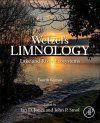Textbook
By: Ian D Jones(Editor), John P Smol(Editor)
1088 pages, ~400 colour & b/w photos and colour & b/w illustrations, colour tables
![Wetzel's Limnology Wetzel's Limnology]()
Click to have a closer look
About this book
Contents
Customer reviews
Biography
Related titles
About this book
Wetzel's Limnology: Lake and River Ecosystems, fourth edition, presents a fully updated revision of the classic textbook Limnology: Lake and River Ecosystems – last published in 2001, after the lead author Robert G. Wetzel passed away in 2005. The coverage has been thoroughly updated with recent research and theoretical developments. Each chapter of this edited volume has been written by an expert, or team of experts, providing a comprehensive and global perspective, with the editors working closely with the authors to maintain continuity within and between the chapters. This is not only an essential textbook for undergraduate and graduate students in limnology but also a standard reference book for seasoned limnologists and other scientists.
Contents
Title page
Table of Contents
Copyright
Tributes to Robert Wetzel
The Editors
Contributors
Chapter 1. Prologue
Chapter 2. The Importance of Inland Waters
Chapter 3. Water as a Substance
Chapter 4. Rivers and Lakes—Their Distribution, Origins, and Forms
Chapter 5. Hydrological Systems
Chapter 6. Light in Inland Waters
Chapter 7. Fate of Heat
Chapter 8. Water Movements
Chapter 9. Structure and Productivity of Aquatic Ecosystems
Chapter 10. Water as a Chemical Environment
Chapter 11. Oxygen
Chapter 12. Salinity and Ionic Composition of Inland Waters
Chapter 13. The Inorganic Carbon Complex
Chapter 14. The Nitrogen Cycle
Chapter 15. The Phosphorus Cycle
Chapter 16. Other Important Elements
Chapter 17. Algae and Cyanobacteria Communities
Chapter 18. Ecology of Algae and Cyanobacteria (Phytoplankton)
Chapter 19. Zooplankton Communities: Diversity in Time and Space
Chapter 20. Ecology and Functioning of Zooplankton Communities
Chapter 21. Benthic Animals
Chapter 22. Fish
Chapter 23. Pelagic Bacteria, Archaea, and Viruses
Chapter 24. Freshwater Plants
Chapter 25. Benthic Algae and Cyanobacteria of the Littoral Zone
Chapter 26. Shallow Lakes and Ponds
Chapter 27. Sediments and Microbiomes
Chapter 28. Organic Carbon Cycling and Ecosystem Metabolism
Chapter 29. Wetlands
Chapter 30. Paleolimnology: Approaches and Applications
Chapter 31. Inland Waters: The Future of Limnology is Interdisciplinary, Collaborative, Inclusive, and Global
Index
Customer Reviews
Biography
Ian Jones, PhD, is a physical limnologist in the Biological and Environmental Sciences Division at the University of Stirling (UK), having previously worked for many years at the UK's Centre for Ecology & Hydrology in Lancaster.
John P. Smol, OC, PhD, FRSC, FRS, is an aquatic ecologist and paleolimnologist and is a Distinguished University Professor in the Department of Biology at Queen's University (Canada). Smol founded and codirects the Paleoecological Environmental Assessment and Research Lab (PEARL), a group of scientists dedicated to the study of long-term environmental change in lakes and rivers.
Textbook
By: Ian D Jones(Editor), John P Smol(Editor)
1088 pages, ~400 colour & b/w photos and colour & b/w illustrations, colour tables
Review of the third edition:
"This newest edition is marked not only by substantial reworking, updating, and addition but also by the maturation of the author's understanding of freshwater ecosystems, and understanding that has been amassed from years of study and analysis of his own and others' research. [...] the author's ability to put the tremendous array of subjects into context is nothing short of remarkable. [...] this book is a timely and masterful revision, and it should be on the shelf and in the classroom of every practicing freshwater algal ecologist and limnologist."
– Carole E. Lembi, Dept of Botany and Plant Pathology, Purdue University, in Journal of Physiological Ecology (2001)


































